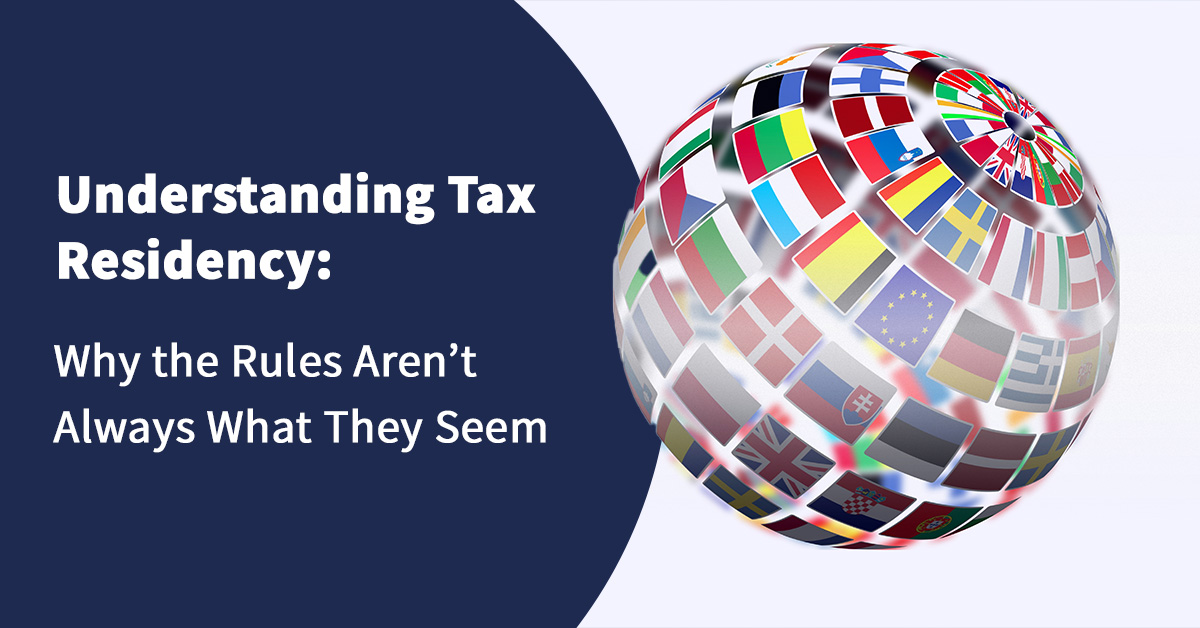When it comes to international tax planning, one of the most misunderstood concepts is tax residency. It’s not as simple as where you live or how many days you spend in a particular country. In fact, tax residency is one of the most nuanced areas of international law — and misunderstanding it can be a costly mistake.
If you’re globally mobile or considering a move abroad, it’s crucial to understand the tax rules of both your home country and your new one. But more importantly, it’s essential to understand how different rules interact — particularly when it comes to tax treaties.
Tax Residency Is Not One-Size-Fits-All
Each country defines tax residency differently for example:
- In the UK, residency is determined using the Statutory Residence Test — a complex set of criteria based on days spent in the UK, your ties to the country, and where your “home” is considered to be.
- In the UAE, a relatively new domestic tax residency regime allows you to be recognised as a tax resident if you:
- Spend at least 183 days in the UAE in a calendar year, or
- Spend at least 90 days in the UAE and have a UAE permanent home, job, or business connection.
So far, so clear. But here’s where it gets tricky…
Domestic Law vs Double Tax Treaties
Even if a country recognises you as a tax resident under its domestic law, that doesn’t automatically mean you’ll qualify as a tax resident under a Double Taxation Agreement (DTA) — which is what truly determines whether you can benefit from treaty protection (like eliminating UK tax on UAE-sourced income, for example).
Let’s look at the UK-UAE tax treaty as a real-world example.
To qualify as a UAE resident under this treaty — and benefit from its provisions — you typically need to:
- Spend at least 183 days in the UAE within a 12-month period, and
- Be able to provide a Tax Residency Certificate issued by the UAE’s Federal Tax Authority (FTA).
So, while you might technically meet the UAE’s domestic threshold at 90 days (especially if you have a job or business there), you won’t qualify for treaty benefits unless you hit the higher 183-day mark.
This distinction is often missed — and can lead to incorrect assumptions about which country has taxing rights over your income, gains, or pensions.
The Tie-Breaker Rule
The tie-breaker rule in Double Taxation Agreements (DTAs) is a mechanism used to determine which country has taxing rights over an individual when both countries consider that individual a tax resident under their domestic laws.
This often happens with mobile individuals, such as expatriates, who may meet the residency criteria in more than one jurisdiction.
Even if you’re considered resident in two countries under each one’s domestic rules, a tax treaty often contains a “tie-breaker” clause to determine which country gets taxing rights.
This clause will usually assess factors such as:
- Where your permanent home is
- Where your centre of vital interests lies (personal and economic ties)
- Where you habitually reside
- Your nationality
Here are some other examples:

Spain
Spain considers you tax resident if:
- You spend more than 183 days in Spain during the calendar year, or
- Your centre of economic interests is in Spain — even if you spend less time there.
So, you could technically be tax resident in Spain even if you don’t pass the 183-day rule — if they can demonstrate you’re running a business or managing assets from there.
Spain is particularly aggressive in asserting residency and is one of the countries where “majority time spent” in another country might help your case only if a Double Tax Treaty applies and the tie-breaker rules kick in.

Portugal
Portugal is relatively straightforward. You are considered tax resident if:
- You spend more than 183 days there in any 12-month period, or
- You have a permanent home there at any time in the tax year that suggests habitual residence.
However, under the Portugal-UK DTA, if you’re resident in both countries, the tie-breaker considers:
- Permanent home,
- Centre of vital interests,
- Habitual abode,
- Nationality.
So, time spent in Portugal vs. the UK can be decisive — but only if the first few factors are inconclusive.
When “Most Time Spent” Matters
In many double tax treaties, if residency is uncertain based on home, interests, or economic ties, a “habitual abode” test is used — essentially, where you spend the most time.
Some examples where this appears in the tie-breaker clause:
- UK–Australia DTA
- UK–New Zealand DTA
- UK–Ireland DTA
So while no country automatically grants you tax residency just because you spend more time there than elsewhere, it can tip the scale when there’s dual residency and the treaty tie-breaker needs to come into play.
Final Thought: Tax Residency Is a Balancing Act
As you can see, tax residency isn’t just about ticking a 183-day box. It’s a multi-layered issue involving:
- Domestic law,
- International treaties,
- Personal and financial ties,
- And sometimes, even your intentions.
This is why residency planning must be done holistically — and not just by tracking days on a calendar.
Thinking of moving abroad?
Visit our page on Financial Freedom Beyond Borders: Securing your financial future overseas
Benefit from comprehensive, integrated, and objective advice.
Let’s discuss your specific needs and how I can help you meet your objectives
Let’s start the conversation
Online enquiry form
Related posts
 Published On: November 10, 2025|5.3 min read|
Published On: November 10, 2025|5.3 min read|How to Choose the Right Financial Adviser Before Moving Abroad (UK Residents Planning to Relocate)
If you’re planning to relocate abroad, find out how a UK-qualified financial adviser can help you prepare. Learn about tax residency, Double Taxation Agreements (DTAs), the Statutory Residence Test (SRT), offshore accounts, and how to structure assets before you leave.
Read more
 Published On: November 7, 2025|6 min read|
Published On: November 7, 2025|6 min read|Should You Sell or Keep Your UK Property When Moving Abroad?
For many people leaving the UK, one of the biggest decisions isn’t what to pack, it’s what to do with the family home or investment property. Should you sell before you leave, or keep it and rent it out while you live abroad?
Read more
 Published On: November 5, 2025|4.8 min read|
Published On: November 5, 2025|4.8 min read|Digital Nomad? Yes. Tax Nomad? No.
Digital nomads can work anywhere, but tax rules still follow. Discover why you can’t be a “tax nomad” and how to plan your residency correctly.
Read more















